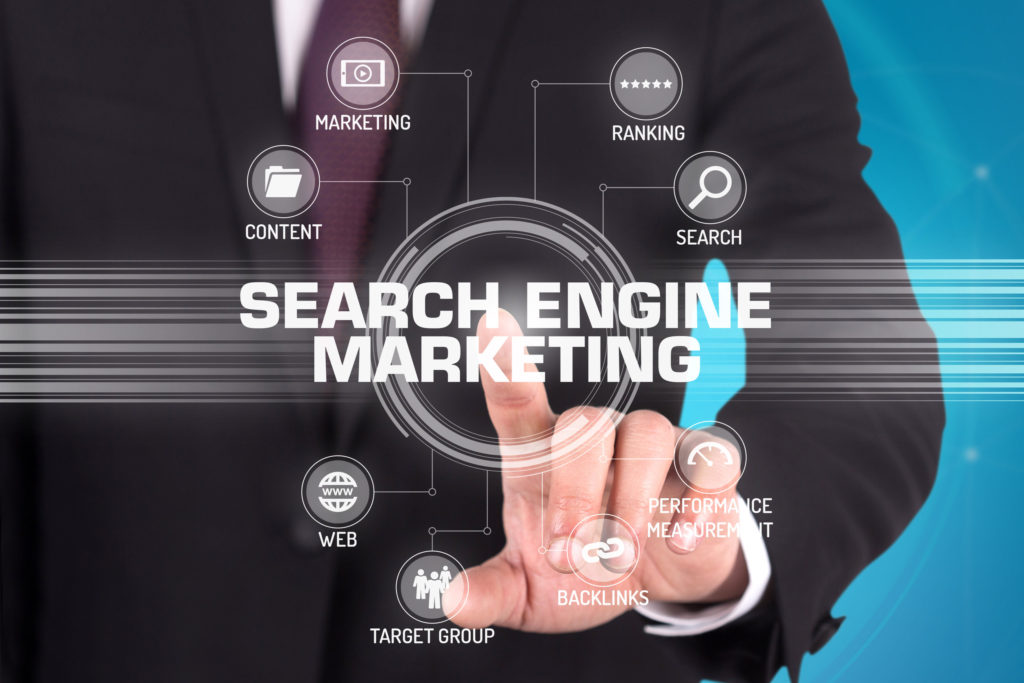
Northern Virginia Search Engine Marketing (SEM)
SEM, or search engine marketing, is typically referring to the tactic of using paid strategies to increase search engine visibility. With SEM, companies pay for ads to appear as search results on search engine results pages. Select keywords are targeted so that when a user searches for those terms, they see an ad from the company. The publisher of the ad either pays a fee every time a user clicks on the paid search result, which is Pay-Per-Click, or it may be a subscription model where there is a monthly or fixed fee for the ad appearance.
Paid search ads can be found on almost any search engine results page (SERP). These paid placements are typically located at the top and bottom of the page, but it varies depending on the platform. They often include an “Ad” designation to let users know that it is a paid placement.
A SEM platform is a search engine where a company can place search ads that are displayed when users perform a search. The most common SEM platforms are Google and Bing.
- Google Ads (also known as “AdWords”) is the most widely used SEM platform. Billions of Google searches are performed a day, so it can help you get in front of the largest online audience.
- Bing Ads claims to connect with 3 million searchers that Google can’t reach. Typically at a lower cost per click, Bing Ads help you connect with searchers who aren’t exclusively using Google for search.
Why SEM?
SEM and other forms of paid online advertising still have substantial strategic value when used prudently as part of a larger marketing strategy. Some of the reasons why you should use SEM in your digital marketing efforts include the following:
- Better Click-through Rates: The average click-through rate for paid search campaigns is 2%. Paid SEM services are several times more likely to move the needle for your business than other forms of digital advertising.
- Potential for Quick Results: Making your way to Page 1 of search results in Google, Bing and other search engines through organic content marketing (SEO) takes time and effort – up to 100 days in many cases. As you build out your organic content and optimize your existing web pages to perform better on search, SEM can help provide some faster relief in the way of generating traffic. Search engine marketing is not a substitute for an organic strategy; however, it is highly useful for supporting the early phases of your content marketing efforts, and also extremely beneficial when there is an adequate ongoing budget or for seasonal promotions.
- Enhanced Brand Awareness: Non-paid search results on the first half of Page 1 regularly see click-through rates of 50% or higher. Nevertheless, paid search results are still the first listings users see as they scroll through Page one. This exposure can help build brand awareness by as much as 80% in some cases, according to Google.
- Ideal Promotion for Local Services: More than 30% of all searches have local intent. For local services such as plumbing, landscaping, and dentists, listing near the top of the results could make the difference between business going to them or to a competitor.
SEO vs. SEM
The main difference between search engine optimization (SEO) and SEM is that SEO is unpaid.
Search engine optimization relies on organic, unpaid content to improve website visibility. This includes on-page optimization with technical SEO and website text optimized to rank for specific keywords. It also relies on off-page optimization through backlink creation, directory submissions, social media marketing, blogging, and other off-site tactics.
Without strong SEO, SEM can end up costing more money. This is because of the important role that Quality Score plays in determining cost per click. Optimizing your website or landing page to rank for certain keywords is therefore important for tempering the cost of PPC strategies.
As a full-service digital marketing agency based in Northern Virginia, River City Marketing can take the reins on your SEM campaign management. Our PPC strategists can help you through every phase of the SEM process and lead you to success. We help you with:
- Setting goals for what you want to achieve through your paid campaign.
- Strategizing how to best use your budget, so that it is optimized.
- Setting up SEM campaigns.
- Making recommendations for how to lower cost per click while improving impressions.
- Crafting short-form ad copy that can improve click-through rates.
- Measuring KPIs (Key Performance Indicators) such as impressions, click-through rates, conversion rates, and other metrics.
- Adjusting the strategy based on findings.
For more details about our SEM services, contact River City Marketing today to learn more or to get started!
Are you ready to achieve online success?
Get started today with a Digital Marketing Strategy from River City Marketing!